A Desperate Dictator: What Could Happen If Assad Uses Chemical Weapons?

Speaking to reporters in Brussels Wednesday, U.S. Secretary of State Hillary Clinton warned that "an increasingly desperate Assad regime might turn to chemical weapons or might lose control of them to one of the many groups that are now operating within Syria."
"As part of the absolute unity that we all have on this issue, we have sent an unmistakable message that this would cross a red line and those responsible would be held to account," Clinton said. "And we intend to make that view as clear as we possibly can."
Clinton joined U.S. President Barack Obama and NATO Secretary General Anders Fogh Rasmussen in condemning the possible use of chemical weapons in Syria. But what would happen, really, if President Bashar al-Assad were to use his chemical weapons?
First, probably an intensifying of rhetoric, and a raising of the readiness of NATO forces, said Jeffery White, a defense fellow at the Washington Institute for Near East Policy.
"There'd be some kind of meaningful posturing," White said. "But deployment might not lead directly to a strike."
Marina Ottoway, a senior associate in the Middle East Program at the Carnegie Endowment for international Peace, said a chemical strike by the Syrians would force the international community to to "give new thought to the idea of intervention."
"It would be such an incredible act if there were widespread gassing of Syrian civilians. The use of chemical weapons would bring the conflict and the humanitarian crisis to a new height," Ottoway said. "It would be something the international community would find very difficult to ignore."
Actually employing the weapons, on the other hand, White said, would be much more likely to provoke a military strike. But he cautioned there were several issues when it comes to Western troop deployment in Syria, including how much warning there is, how much political groundwork had been laid for a strike, and, perhaps most importantly, sorting out what actually happened.
Ottoway agreed that "you don't improvise an intervention."
"One kind of intervention would be to simply try to destroy sites where we know weapons are stored," Ottoway said. "That probably could be done relatively quickly. An intervention to really secure the fight would require putting boots on the ground. I'm not sure we are ready to do that."
"The Syrians are going to put up a cloud of confusion," White said. "There'll be statements about terrorists who did it; they'll do their best to confuse the issue of what happened or who was actually hit."
White speculated that Assad would be most likely to use the weapons in areas where the Free Syrian Army was a known presence, without much care as to whether the populace was mixed in with combatants. "My sense is they'd try a limited use, and claim that it was terrorists and outsiders," White said.
Rumors that Assad may flee to Latin America have also begun to swirl. The Israeli newspaper Haaretz reported that Deputy Foreign Minister Faisal al-Miqdad has been in meetings in Cuba, Venezuela and Ecuador in the past week, and had with him personal letters from Assad to the various heads of state. Venezuelan President Hugo Chavez is a vocal supporter of Assad.
U.N. Secretary General Ban Ki-Moon, speaking to the AP during a U.N. climate summit in Qatar, said he did not favor an "asylum deal" for Assad.
"Whoever commits [a] gross violation of human rights must be held accountable and should be brought to justice," Ban said. "This is a fundamental principle."
On Monday a spokesman for the Syrian Foreign Ministry was the latest Syrian diplomat to defect and flee. Even though the diplomat, the 40-something Jihad al-Makdissi, had little influence in the government, his defection is seen as further evidence that the Assad regime is crumbling.
"I think the regime knows its military position is getting worse and worse," White said. "Analysts always say the main goal of the Syrian regime is to survive. And maybe this is a case where he would say that his regime might have a chance of surviving."
Ottoway took an opposite view of chemical weapons. "I doubt he really thinks that he can use them on a large enough scale to end the insurrection," she said. "There are too many fires burning in that country. Assad knows that far from securing his control over the country, chemical weapons use would leave to international intervention."
Then again, a desperate man is not always a rational man.
"We cannot assume Assad is going to be rational. Assad may be convinced that he's going to die," Ottoway said. "The question is, is he going to bring down the temple with him?"
© Copyright IBTimes 2024. All rights reserved.












